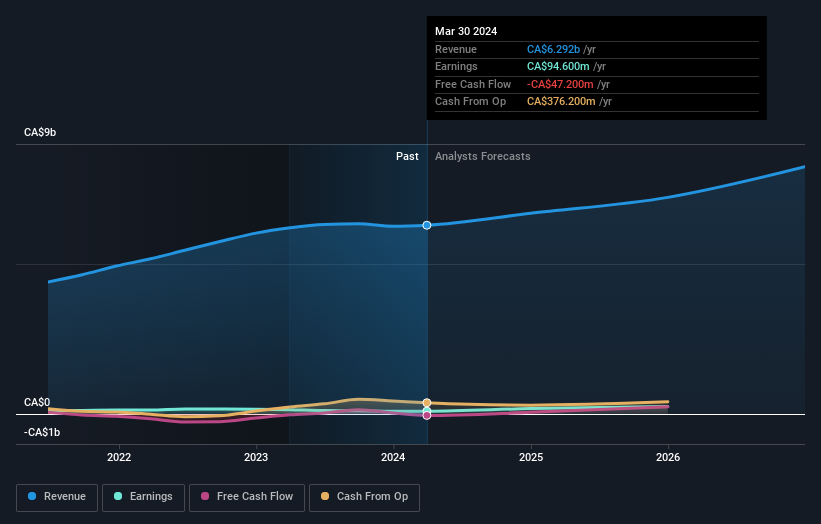Institutions own 30% of Premium Brands Holdings Corporation (TSE:PBH) shares but individual investors control 52% of the company
Key Insights
Significant control over Premium Brands Holdings by individual investors implies that the general public has more power to influence management and governance-related decisions
45% of the business is held by the top 25 shareholders
To get a sense of who is truly in control of Premium Brands Holdings Corporation (TSE:PBH), it is important to understand the ownership structure of the business. With 52% stake, individual investors possess the maximum shares in the company. In other words, the group stands to gain the most (or lose the most) from their investment into the company.
And institutions on the other hand have a 30% ownership in the company. Institutions will often hold stock in bigger companies, and we expect to see insiders owning a noticeable percentage of the smaller ones.
Let's take a closer look to see what the different types of shareholders can tell us about Premium Brands Holdings.
View our latest analysis for Premium Brands Holdings
What Does The Institutional Ownership Tell Us About Premium Brands Holdings?
Institutions typically measure themselves against a benchmark when reporting to their own investors, so they often become more enthusiastic about a stock once it's included in a major index. We would expect most companies to have some institutions on the register, especially if they are growing.
We can see that Premium Brands Holdings does have institutional investors; and they hold a good portion of the company's stock. This can indicate that the company has a certain degree of credibility in the investment community. However, it is best to be wary of relying on the supposed validation that comes with institutional investors. They too, get it wrong sometimes. When multiple institutions own a stock, there's always a risk that they are in a 'crowded trade'. When such a trade goes wrong, multiple parties may compete to sell stock fast. This risk is higher in a company without a history of growth. You can see Premium Brands Holdings' historic earnings and revenue below, but keep in mind there's always more to the story.
Our data indicates that hedge funds own 15% of Premium Brands Holdings. That catches my attention because hedge funds sometimes try to influence management, or bring about changes that will create near term value for shareholders. Mackenzie Financial Corporation is currently the company's largest shareholder with 15% of shares outstanding. Canada Pension Plan Investment Board is the second largest shareholder owning 8.1% of common stock, and IG Investment Management, Ltd. holds about 4.1% of the company stock. Furthermore, CEO George Paleologou is the owner of 0.9% of the company's shares.
A deeper look at our ownership data shows that the top 25 shareholders collectively hold less than half of the register, suggesting a large group of small holders where no single shareholder has a majority.
Researching institutional ownership is a good way to gauge and filter a stock's expected performance. The same can be achieved by studying analyst sentiments. Quite a few analysts cover the stock, so you could look into forecast growth quite easily.
Insider Ownership Of Premium Brands Holdings
The definition of an insider can differ slightly between different countries, but members of the board of directors always count. Management ultimately answers to the board. However, it is not uncommon for managers to be executive board members, especially if they are a founder or the CEO.
Most consider insider ownership a positive because it can indicate the board is well aligned with other shareholders. However, on some occasions too much power is concentrated within this group.
Shareholders would probably be interested to learn that insiders own shares in Premium Brands Holdings Corporation. It is a pretty big company, so it is generally a positive to see some potentially meaningful alignment. In this case, they own around CA$99m worth of shares (at current prices). If you would like to explore the question of insider alignment, you can click here to see if insiders have been buying or selling.
General Public Ownership
The general public, who are usually individual investors, hold a substantial 52% stake in Premium Brands Holdings, suggesting it is a fairly popular stock. This size of ownership gives investors from the general public some collective power. They can and probably do influence decisions on executive compensation, dividend policies and proposed business acquisitions.
Next Steps:
I find it very interesting to look at who exactly owns a company. But to truly gain insight, we need to consider other information, too. Be aware that Premium Brands Holdings is showing 3 warning signs in our investment analysis , and 2 of those are a bit unpleasant...
Ultimately the future is most important. You can access this free report on analyst forecasts for the company.
NB: Figures in this article are calculated using data from the last twelve months, which refer to the 12-month period ending on the last date of the month the financial statement is dated. This may not be consistent with full year annual report figures.
Have feedback on this article? Concerned about the content? Get in touch with us directly. Alternatively, email editorial-team (at) simplywallst.com.
This article by Simply Wall St is general in nature. We provide commentary based on historical data and analyst forecasts only using an unbiased methodology and our articles are not intended to be financial advice. It does not constitute a recommendation to buy or sell any stock, and does not take account of your objectives, or your financial situation. We aim to bring you long-term focused analysis driven by fundamental data. Note that our analysis may not factor in the latest price-sensitive company announcements or qualitative material. Simply Wall St has no position in any stocks mentioned.

 Yahoo Finance
Yahoo Finance 

